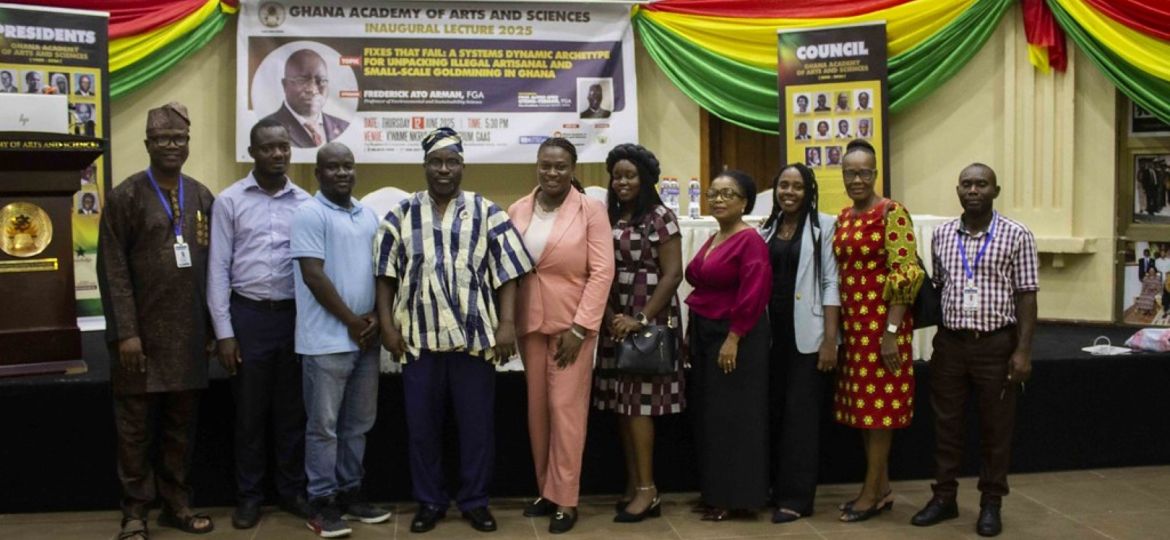
Professor Frederick Ato Armah, FGA, an expert in environmental and sustainability science, has called for a bold rethinking of Ghana’s approach to illegal artisanal and small-scale gold mining (ASM), popularly known as galamsey.
Delivering his inaugural lecture at the Ghana Academy of Arts and Sciences (GAAS) on Thursday, 12th June 2025, Prof. Armah spoke on the theme “Fixes That Fail: A Systems Dynamic Archetype for Unpacking Illegal Artisanal and Small-Scale Goldmining in Ghana.”
He critiqued Ghana’s current strategies for addressing galamsey as typical examples of the “Fixes That Fail” systems archetype—short-term, reactionary measures such as military crackdowns and the destruction of equipment that yield unintended consequences and often worsen the situation.
“These actions,” he explained, “not only fail to resolve the underlying drivers of illegal mining but can also provoke resistance, especially in communities where mining is deeply embedded in cultural identity and livelihood.”
As Ghana’s premier learned society, GAAS exists to promote the advancement and dissemination of knowledge in all branches of science and the humanities. Through its public lectures, forums, and scholarly outputs, the Academy provides an independent platform for addressing pressing national and global issues with intellectual rigour. Inaugural Lectures such as this one celebrate newly inducted Fellows and serve as avenues for contributing research-based insights to national development.
To effectively confront the galamsey challenge, Prof. Armah proposed a five-pronged strategy built around vision, skills, incentives, resources, and coordinated action. He emphasized that many of Ghana’s policies have failed because they lacked coherence and did not address root causes such as poverty, limited economic opportunities, weak institutional frameworks, and strong socio-cultural ties to land and mining practices. “In some areas,” he noted, “mining is not just work, it’s a legacy.
Attempts to end it through brute force are often met with resistance, not necessarily out of defiance, but in defence of identity.” He advocated the formalisation of the ASM sector through licensing, structured training, the provision of environmentally sound equipment, and the promotion of sustainable mining practices. He also stressed that proposed alternative livelihoods must be culturally sensitive and community-accepted to succeed in the long term.
Prof. Armah called on academia, civil society, and government to adopt systems thinking, approaching problems not with simplistic solutions but with a mindset open to learning, innovation, and adaptation.
The lecture was chaired by Professor Alfred Apau Oteng-Yeboah, FGA, Vice President of the Sciences Section of GAAS. He praised the lecture as a vital and timely contribution to Ghana’s ongoing discourse on environmental protection and sustainable development.
The event drew participation from a wide range of stakeholders, including representatives of the Environmental Protection Agency (EPA), Minerals Commission, Water Resources Commission, Ministry of Lands and Natural Resources and the Ghana Chamber of Mines.
Also in attendance were Emerita Professor Isabella Akyinbah Quakyi, FGA, President of GAAS, the GAAS Council, Fellows of the Academy, and students from Accra Academy, Accra Girls’ Senior High School, and other second-cycle institutions, signalling the Academy’s commitment to fostering informed engagement across generations.
























